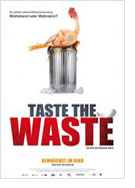

Opening 8 Sep 2011
Directed by:
Valentin Thurn
Writing credits:
Valentin Thurn
Ever hear the bendy gurken (cucumber) story? The European Union (EU) instigated rules that gurkens be straight, because that is what the trade wanted – easier to package and sell. Eventually the EU changed the rules, however supermarkets still only buy straight gurkens that fit in standardized boxes. Generally speaking, people only buy the prettiest, biggest, and best; super markets in France throw away 5-600 tons of food yearly. A German farmer throws 40-50% of his crop back on the field because the potatoes are too big, small or blemished; he lets people collect the throw-a-ways and, one gent admits what he collects lasts through winter. Annually people toss never opened and/or food that is still within the ‘best buy’ date – approximately 100 pounds (45 kilos) per household.
“Every year 90 million tons of food is thrown away in the EU. If every (garbage) truck were put front- to back-end, they would circle the globe.”
In Paris a woman works sorting through wholesale markets’ leftovers to give the poor, bemoaning the fact that in her native Cameroon people would eat the bananas she throws away if they could afford them, and in Cameroon farmers lament how their land has been appropriated by banana plantations. In the USA, 5-10% of good crops are “turned under (ground)”; farmers’ markets eliminate layers of infrastructure, and one woman’s toddler’s allergies vanished since buying at the market – “eating healthy is cheaper”. A study of about 60 landfills in the USA and Canada exposed if food waste was reduced by half, it would cut 7½% of methane gas that effects the Ozone.
“With the food thrown away in Europe and North America, all the starving in the world could be fed three times.”
A German baker, with a daily 20% overage, has partnered with an energy concern whereby every 4½-ton container of tossed bread is processed, resulting in 900 liters (238 gallons) heating oil for his ovens. Japan, not naturally resource rich, has reinforced and control recycling in the last 10 years so that waste is fed to animals. Hamburg, Germany has a biogas plant that generates energy from society’s glut, while in Berlin children are taught how to prepare fresh vegetables (that they then teach their parents). A New York City beekeeper taps in to an unutilized resource, recognizing the symbiotic relationship between his honeybees and city/windowsill gardens, and one Brooklyn rooftop gardener says people now have a chance to see where food comes from; looking at a tomato hanging on a plant, she has been asked, “is this an apple?”
From beginning until the final end credit, writer/director Valentin Thurn and team do not waste a minute of screen time in this admirably crafted, information packed, thought-provoking documentary. Taste the Waste should be required viewing for people of all ages; humans need to live less extreme lifestyles. Take note of the sensible dumpster diving rules: “first there gets first choice”, and, “never take more than you need”. (Marinell Haegelin)